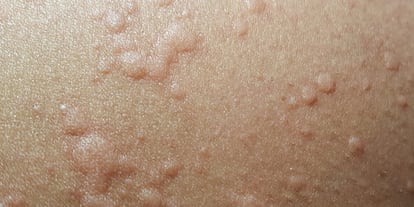Diarrhea, hives and headaches: The lesser-known symptoms of the coronavirus
Spanish physicians are warning that there may be a second wave of transmissions if the public is not made more aware of all the possible manifestations of Covid-19

When people were warned to look out for symptoms of the novel coronavirus, only three signs were indicated: coughing, fever and breathing problems. But these are not the only indications, warn primary healthcare physicians, who argue that recognizing all possible manifestations will be key to keeping the outbreak under control when Spain’s confinement measures are eased.
We let people return to work who don’t know to check if their headache is due to the coronavirus, and that’s dangerousPediatrician Aser García Rada
“We began to suspect from the beginning that there were other symptoms,” says Ricardo González, the director of the San Fermín health center in Madrid. According to González, hives and diarrhea are the other possible indicators of the disease that have been most frequently seen. “When someone comes to us [with these symptoms] we send them to the respirator area,” says González, in reference to the spot health centers have created for suspected coronavirus cases. He admits, however, that they are working without a set protocol, based on what they read and hear from other physicians.
An editorial published Friday in the British Medical Journal also indicated other signs that could be symptoms of Covid-19. Apart from the loss of sense of smell and taste, which was detected a month ago, the editorial reported that neurological problems, stroke, disorientation, headaches, myocarditis, thrombosis and vision problems, among others, could be other possible symptoms.
The list of suspected symptoms of Covid-19 is growing as health workers are faced with different manifestations. Isabel Morales, the president of the Pediatric Nursing Association, says that her colleagues in outpatient care have found that children with coronavirus also experience diarrhea, itchiness and chilblains.
“We are still learning about how the virus behaves,” says pediatrician Aser García Rada. “A month ago anosmia [the loss of the sense of smell] was related to the virus. Fifteen days ago, colleagues warned about hives. The problem is that the extension and intensity of symptoms is very wide.”
We began to suspect from the beginning that there were other symptomsRicardo González, director of the San Fermín health center in Madrid
“Now we are seeing in one home that the father has what he calls the worst flu of his life, the mother has headaches and a sore throat, the youngest child has bronchiolitis, and the eldest has gastroenteritis, within a week,” he explains.
García Rada worries that some non-essential workers may have returned to the workplace last week, when the two-week economic hibernation came to an end, without realizing the full range of coronavirus symptoms. “Now we are telling people that if they have a cough, fever or dyspnea [difficulty breathing] they should stay at home,” he says. “But a week ago, we let people return to work who don’t know to check if their headache is due to the coronavirus, and that’s dangerous.” The editorial in the British Medical Journal also warned that ignoring the wide range of possible symptoms could lead to a second wave of transmissions.
To avoid this from happening, García Rada recommends “treating any acute infection as possible Covid-19 until a test rules it out.” “The problem is we don’t have them,” he explains. Until more testing is available, identifying coronavirus cases will depend on the clinical eye of health professionals.
English version by Melissa Kitson.
Tu suscripción se está usando en otro dispositivo
¿Quieres añadir otro usuario a tu suscripción?
Si continúas leyendo en este dispositivo, no se podrá leer en el otro.
FlechaTu suscripción se está usando en otro dispositivo y solo puedes acceder a EL PAÍS desde un dispositivo a la vez.
Si quieres compartir tu cuenta, cambia tu suscripción a la modalidad Premium, así podrás añadir otro usuario. Cada uno accederá con su propia cuenta de email, lo que os permitirá personalizar vuestra experiencia en EL PAÍS.
¿Tienes una suscripción de empresa? Accede aquí para contratar más cuentas.
En el caso de no saber quién está usando tu cuenta, te recomendamos cambiar tu contraseña aquí.
Si decides continuar compartiendo tu cuenta, este mensaje se mostrará en tu dispositivo y en el de la otra persona que está usando tu cuenta de forma indefinida, afectando a tu experiencia de lectura. Puedes consultar aquí los términos y condiciones de la suscripción digital.








































